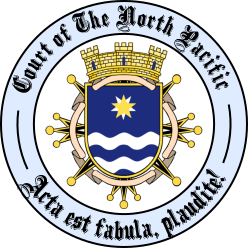- TNP Nation
- Kranostav
1. What law, government policy, or action (taken by a government official) do you request that the Court review?
Previous court ruling number 31, On the Time at Which Oaths Become Binding.
2. What portions of the Constitution, Bill of Rights, Legal Code, or other legal document do you believe has been violated by the above? How so?
The current existing law governing membership of the Regional Assembly, commonly also known as ‘citizenship’, stipulates that if the Speaker fails to process a citizenship application within seven days, the application will be automatically processed and granted citizenship.
The above linked court ruling states that the oath becomes binding when, among other requirements, “The applicant has neither been accepted nor rejected after 14 days pass from the date of their application.”
The court ruling was correct for its time, when the existing law in November of 2013 allowed 14 days instead of 7. However, given the passing of the Accelerated Admission Act , this ruling is no longer in line with current law.
3. Are there any prior rulings of the Court that support your request for review? Which ones, and how?
Previous court ruling number 41, On the Physical Representation of Outdated Rulings on Requests for Review, establishes the ability for Requests for Review (R4R) rulings to result in the overruling of previous court rulings, as is being proposed in this R4R.
4. Please establish your standing by detailing how you, personally, have been adversely affected. If you are requesting a review of a governmental action, you must include how any rights or freedoms of yours have been violated.
Standing derived by my position as Court Examiner, defined in Legal Code Section 3.6, Clause 34: "The Court Examiner will have standing in all cases of judicial review brought before the Court."
5. Is there a compelling regional interest in resolving your request? If so, explain why it is in the interest of the region as whole for your request to be decided now.
This request looks to address a ruling by the Court that was issued during a period of time in which the laws governing membership of the regional assembly, also referred to as citizenship, allowed more time for the speaker to process applications than current law allows. This is a simple discrepancy that touches an important part of the citizenship process. It is therefore in the interest of the region, and all those who may ever apply for citizenship, that this discrepancy be addressed so as to preserve the accuracy of standing precedent.
6. Do you have any further information you wish to submit to the Court with your request?
N/A
Previous court ruling number 31, On the Time at Which Oaths Become Binding.
2. What portions of the Constitution, Bill of Rights, Legal Code, or other legal document do you believe has been violated by the above? How so?
Section 6.1 Clause 13 of the Legal Code:The Speaker will process applications within 7 days. If an applicant has not been approved or rejected within that time, they will be automatically granted citizenship.
The current existing law governing membership of the Regional Assembly, commonly also known as ‘citizenship’, stipulates that if the Speaker fails to process a citizenship application within seven days, the application will be automatically processed and granted citizenship.
The above linked court ruling states that the oath becomes binding when, among other requirements, “The applicant has neither been accepted nor rejected after 14 days pass from the date of their application.”
The court ruling was correct for its time, when the existing law in November of 2013 allowed 14 days instead of 7. However, given the passing of the Accelerated Admission Act , this ruling is no longer in line with current law.
3. Are there any prior rulings of the Court that support your request for review? Which ones, and how?
Previous court ruling number 41, On the Physical Representation of Outdated Rulings on Requests for Review, establishes the ability for Requests for Review (R4R) rulings to result in the overruling of previous court rulings, as is being proposed in this R4R.
4. Please establish your standing by detailing how you, personally, have been adversely affected. If you are requesting a review of a governmental action, you must include how any rights or freedoms of yours have been violated.
Standing derived by my position as Court Examiner, defined in Legal Code Section 3.6, Clause 34: "The Court Examiner will have standing in all cases of judicial review brought before the Court."
5. Is there a compelling regional interest in resolving your request? If so, explain why it is in the interest of the region as whole for your request to be decided now.
This request looks to address a ruling by the Court that was issued during a period of time in which the laws governing membership of the regional assembly, also referred to as citizenship, allowed more time for the speaker to process applications than current law allows. This is a simple discrepancy that touches an important part of the citizenship process. It is therefore in the interest of the region, and all those who may ever apply for citizenship, that this discrepancy be addressed so as to preserve the accuracy of standing precedent.
6. Do you have any further information you wish to submit to the Court with your request?
N/A



